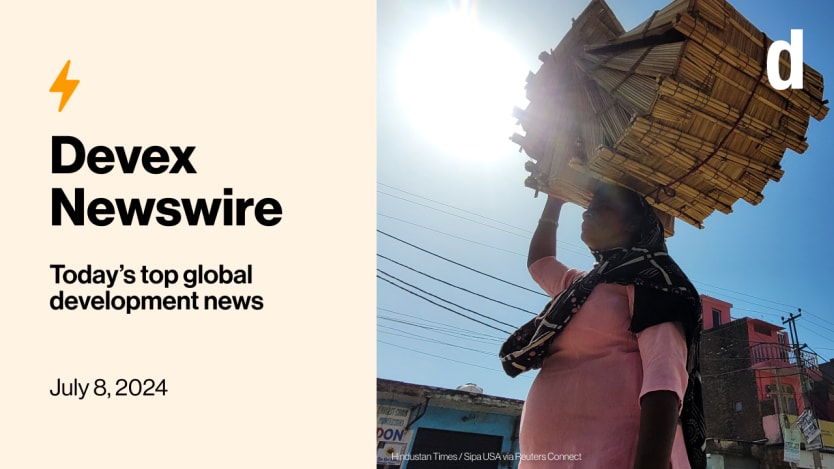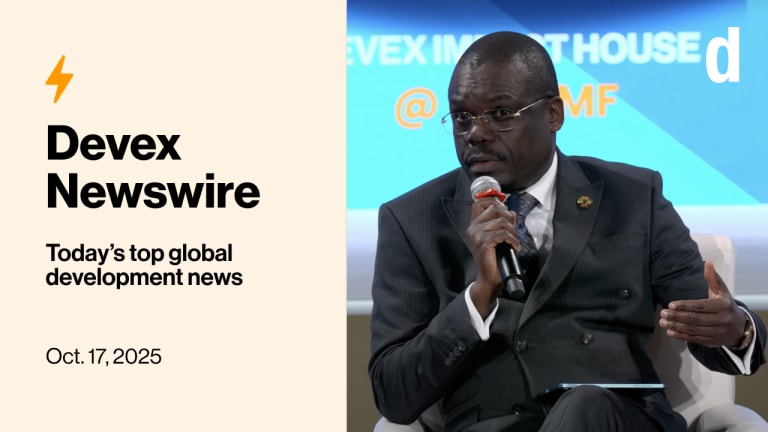Presented by Grant Assistant

Financial cover is giving women in India’s informal economy “choice, power and opportunity” when it’s too hot to work safely.
Also in today’s edition: New British Prime Minister Keir Starmer’s first-day U.K. aid surprise, and running the rule over the COP 29 host’s green credentials.
+ Take our five-item quiz and check how well you kept up with globaldev news in the past month.
Parametric pays out
Heat. That’s the key factor pushing female workers into poverty in an India increasingly gripped by deadly temperatures, according to Kathy Baughman McLeod, CEO of nonprofit Climate Resilience for All.
This is a preview of Newswire
Sign up to this newsletter for an inside look at the biggest stories in global development, in your inbox daily.
With the frequency and severity of heat waves on the rise, the problems will only grow for informal workers who lack job protections — and confronted with a terrible choice of taking risks in a dangerously hot workplace or losing income.
Help is now at hand, thanks to an innovative form of insurance that pays out automatically once agreed thresholds have been crossed, rather than relying on indemnity insurance which is triggered only for specific losses.
Parametric insurance has already provided relief to 92% of the 50,000 women insured under a scheme piloted by a partnership between Climate Resilience for All and the Self Employed Women’s Association labor union.
The payouts have enabled women to carry on paying for essentials such as food and school fees, and retain their “self-respect, dignity, credit worthiness,” Baughman McLeod tells Delhi-based Devex contributing reporter Catherine Davison.
“Isn’t that all we want — for women to have choice and power and opportunity?” the CEO says.
The scale of the challenge is clear. Summer temperatures in many cities in northern India consistently exceed 40 degrees Celsius, and reinsurer Swiss Re says India’s natural catastrophe protection gap — the level of economic loss not covered by insurance — is one of the world’s highest, at 95%.
Read: As India battles deadly heat waves, can insurance offer relief? (Pro)
+ Not a Devex Pro member yet? For a limited time, we’re offering $100 off on an annual Pro membership. Sign up today. You’ll also get access to Devex Pro Week, happening from July 22-26 and featuring exclusive, in-depth events and analysis on the key forces shaping global development.
Climate finance confusion
The urgent need for funds to help lower-income countries hit hardest by climate change is why governments were locked in talks in Bonn, Germany — where they made too little progress, experts warned afterwards.
But the lack of climate finance provided by rich nations is not the only concern. The quality of that finance also matters, including whether money badged as “climate finance” is, all too often, providing questionable climate gain.
The U.K. organization Development Initiatives has been delving into the details, discovering an eye-popping increase in aid scored as climate finance for projects which, in its own words, “would have happened anyway.”
In its study, it has calculated that funding for schemes where tackling the changing climate and its impacts was “not the fundamental driver or motivation” has soared tenfold over 15 years, set against a 200% rise for projects where that was the “principal” objective.
Euan Ritchie, the study’s author, says the figures proved the need for reform to prevent wealthy nations parking what are essentially nonclimate projects under the “climate finance” banner.
"If the donor can’t explain what impact a project has on climate objectives, for example a reduction in greenhouse gas emissions, then it shouldn’t be able to count that project as climate finance,” he tells me.
The study makes a wider case for reform, including greater transparency of future
“commitments” to “avoid double counting,” proper documentation, and even the use of machine learning tools to better interrogate dodgy claims.
Read: Study highlights rise in ‘climate finance’ for non-climate projects
ICYMI: As UN warns of ‘detour’ midway to COP 29, where are climate talks at? (Pro)
On the road to Baku
These controversies will come to a head in November, at the 29th United Nations Climate Change Conference — or COP 29 — which will be staged in Baku, the capital of the oil-rich republic of Azerbaijan.
Prepare for a rerun of the row over last year’s host, the United Arab Emirates, which has a poor human rights record and whose government picked an oil executive as the summit’s president.
Likewise, Azerbaijan has named a former oil executive as COP 29 president-designate but, as Devex contributing reporter Stéphanie Fillion points out, that is not the sole reason why the country’s moment in the spotlight will raise hackles.
It’s less than one year since Azerbaijan launched a rapid military offensive to retake the disputed breakaway territory of Nagorno-Karabakh, which triggered the exodus of more than 100,000 ethnic Armenians.
A charm offensive has followed to market the war-ravaged land as a green haven, Stéphanie says, after $3.1 billion was pumped into reconstruction projects “including three near-empty airports.”
Can it succeed? “I don't think they're going to enjoy the international attention as much as they expect,” Alissa de Carbonnel, Europe and Central Asia deputy program director at the International Crisis group, tells her.
Read: Azerbaijan’s gamble to rebrand a green Nagorno-Karabakh at COP 29
Nandy’s job shift
The United Kingdom’s new Labour prime minister is known as “no drama Starmer” because he promises dull stability after years of political chaos — but Sir Keir sprang a first-day surprise for international development.
Lisa Nandy spent 10 months preparing to take on the brief, attending U.N. and World Bank summits and setting out tentative plans to give U.K. aid a new focus on lowest-income countries, but has instead become her country’s culture secretary.
The reshuffle allowed Nandy to be a full Cabinet member, instead of being a number two — after the decision not to restore a separate aid department — and saw her replaced by Anneliese Dodds, who had been the party chair. Bizarrely, the U.K. government took two days announce Dodds’ appointment. In the interim, the only reason anyone knew was the card placed in front of her on the Cabinet table on Saturday which read “Minister of State (Development)."
Dodds’ boss, the new secretary of state for foreign, commonwealth, and development affairs, is the expected choice: David Lammy, who opposed the merger that formed the Foreign, Commonwealth & Development Office and who made waves in 2022 with an outspoken attack on “patronising or paternalistic” aid delivery models.
Lammy backed that up by condemning NGOs that fundraise using “old-fashioned colonial” images of people with “a swollen belly and flies around them.” The next few years could yet be another interesting ride for the aid sector.
ICYMI: Labour is likely to win the UK election. What would that mean for aid? (Pro)
Health care in war’s ‘crosshairs’
It must be tempting for humanitarian workers to despair, contemplating the 180 armed conflicts around the world and the 2 billion people — a quarter of humanity — exposed to the impoverishment, displacement, hunger, and disease they cause.
Furthermore, as Mukesh Kapila, a U.K. professor of global health and humanitarian affairs, writes in an opinion article for Devex: “health care has moved into the crosshairs of warring parties” — the target of more than 2,500 attacks in 2023, often deliberately.
But, Kapila argues, this growing civilian toll of death and disease is not inevitable if health and aid providers adopt a different mindset and “small-is-better-and-safer” methods.
It is a call for “enabling local skills to lead”; for improving “self-care skills” for chronic afflictions such as diabetes and hypertension; for “rethinking infrastructure” to move away from large hospitals vulnerable to attack; for the use of artificial intelligence; and to teach the public the lost skills of first aid.
“The humanitarian — including health — enterprise is a “wholesale” affair dominated by multibillion-dollar agencies. With size comes complexity and heavy-footedness,” Kapila warns.
Opinion: Shifting humanitarian health rules will save lives in conflict
In other news
The newly installed U.K. Foreign Secretary David Lammy said he would increase support for Caribbean countries affected by Hurricane Beryl to £500,000 as Britons join global relief efforts. [The Guardian]
Land routes traversed by asylum-seekers and migrants across Africa to reach the Mediterranean are deadlier compared to the sea voyage, a new report highlights. [AP News]
South Korea has granted $1 billion in concessionary loans to Rwanda for projects in transport, health care, and education. [Reuters]
Sign up to Newswire for an inside look at the biggest stories in global development.








